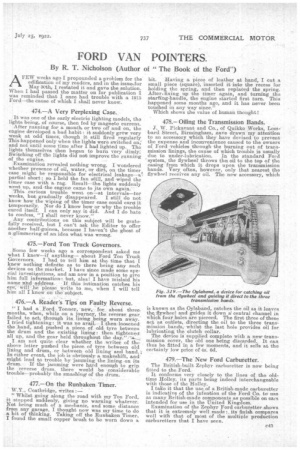FORD VAN POINTERS.
Page 25

If you've noticed an error in this article please click here to report it so we can fix it.
By R. T. Nicholson (Author of "The Book of the Ford")
AFEW weeks ago I propounded a problem for the edification of my readers, and in the issueefor May 30th, I restated it and gave the solution. When I had passed the matter on for publication I was reminded that I once had trouble with a 1913 Ford—the cause of which I shall never know.
474.—A Very Perplexing Case.
It was one of the early electric lighting models, the lights being, of course, then fed by magneto current. After running for a month or two off and on, the engine developed a bad habit : it suddenly grew very weak at odd times, though it still fired regularly This happened only when the lights were switched on; and not until some time after I had lighted up. The lights themselves then began to burn very dimly: Switching off the lights did not improve the running of the engine.
Examination revealed nothing wrong. I wondered whether presence of oil, water, or dirt, on the timer, case might be responsible for electrical leakage—a, partial short : SO1 I held the fan still, and wiped the tinier case with a rag. Result—the lights suddenly went up, and the engine. came to its own again."'
This curious trouble went on—at intervals—for weeks, but gradually disappeared. I still do not know how the wiping of the timer case amid cure e it temporarily. Nor do I know bow or why the trouble cured itself. I can only say it did. And I do hate to confess, "I shall never know."
Any contributions on this subject will be gratefully received, but I can't ask the Editor to offer another half-guinea, because I haven't the ghost of a glimmering of an idea what, was wrong.
475.—Ford Ton Truck Governors.
Scania few weeks ago a correspondent asked me what I knew—if anything— about Ford Ton Truck Governors. I had to tell him at the time that I knew nothing definite as to there being any such devices on the market. I have since made some special investigations, and am now in a position to give him full informatione but, alas! I have mislaid his name and addrese.. If thie intimation catches his eye, will he 'please write to me, when I will tell him all I know on. the subject.
476.—A Reader's Tips on Faulty Reverse. . .
"I had a, , Forel Twiner, new, for about three. months, when, while on a journey, the reverse gear, failed to act, through its lining being worn away. I tried tightening : it wae no ayaiL , I then-loosened. the hand, and pushed a piece Of old tyre between the drum and the existing lining : then tighteneer all up, and the gear held throughout the day." e.e,,_,,, I am not quite clear whether the writer of the above letter pushed the piece of tyre between old lining and drum, or between old lining and band. In either event, the job is obviously a makeshift, and might lead to trouble by "jamming the lining on its drum. If the jamming were hard enough to grip the reverse drum, there would be considerable trouble—probably the smashing of the drum.
477.—On the Runbaken Timer.
' W.V., Coatbridge, writes :—
"Whilst going along the road with my Ton Ford, it stopped suddenly, giving no warning whatever. Not being much of a mechanic, and some distance from any garage, I thought now was my time to do a bit of thinking. Taking off the Runbaken Timer, I found the small copper brush to be worn down a bit. Having a piece of leather at hand, I cut a small piece (square), inserted it into the recess for holding the spring, and then replacedthe spring. After.fixing up the timer again, and turning the starting-handle, the engine started first turn. This happened some months ago, and it has never been touched in any way since."
Which shows the value of human thought!
478.— Oiling the Transmission Bands.
J. W. Pickavant and Co., of Quikko Works, Lombard Street, Birmingham, nave drawn my attention to an accessory which they have devised to prevent the expense and inconvenience caused to the owners of Ford vehicles through the burning out of transmission linings, the cause of which troubleis usually
due to under-lubrication. In the standard Ford ' system, the flywheel throws thee oil to the top of the casing from which it drops upon the transmission bands. Very often, however, only that nearest the flywheel receives any oil. The new accessory, which is known as the Oylaband, catches the oil as it leaves the. flywheel and guides it down a central channel in which four holes are pierced. The first three of these act as outlets, directing the oil to the three transmission bands, whilst the last hole provides oil for lubricating the clutch collar.
The device is supplied complete with a new transmission cover, the old one being discarded. It can thus be fitted in a few moments, and it sells at the certainly low price of 4s. 6d.
479.—The New Ford Carburetter.
The British-built Zephyr carburetter is now being fitted to the Ford.
It conforms very closely to the lines of the oldtime Holley, its parts being indeed interchangeable with those of the Holley. I take it that the use of a British-made carburetter is indicative of the intention of the Ford Co. to use as many British-made components as possible on eaes intended for use in the United Kingdom. Examination of the Zephyr Ford carburetter shows that it is extremely well made :, its finish compares well with that of most of the multiple production carburetters that I have seen.






























